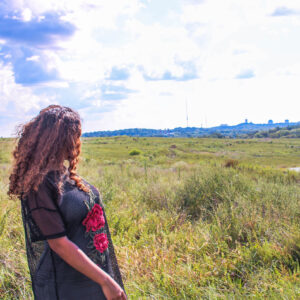This week celebrates the world’s first ever Intergenerational Fairness Day. In this article, Aissa Dearing-Benton, US climate activist, explains her personal journey bringing people of colour into climate activism

My secret park
Less than a quarter-mile away from my house lies a secret. Formerly a landfill site, this secret is now a lush green oasis within my hometown of Durham, North Carolina. My mother and I had a tradition. At the time, my father was abusive, and he suffered from alcoholism. To get away from the chaos, at least once a day, my mother and I would sneak around the gates of this landfill site and explore the pine-covered trails to be at peace. We would have daily adventures in this secret park; finding pieces of construction that protruded from the dirt and calling it “natural art”, bringing our beach chairs with us in order to enjoy the vista that sat in the middle of the park, or picnicking on small snacks we were able to sneak out of the house. As we grew to love the park, we began naming the different trails for what surrounded them; “Mulberry Bend”, “Rusty Way”, and “Mimosa Circle”, just to name a few. It was a home away from home that my father didn’t know about and couldn’t tarnish. A couple of years after the discovery of this park, my home situation quickly escalated, as my father became more physically violent and the police had to get involved. Though I do not visit the park as often, it remains a sacred place and houses some of my fondest childhood memories — and of course, it remains the best-kept secret of Durham.
Environmentalism – a lightbulb moment
My love for the environment, especially for this park, stems from a place I went to after school to feel safe. Though I loved the environment, I did not see myself as an “environmentalist.” When I first learned of the climate crisis, I found it so unrelatable. It felt like an issue that was distant from my community and that more everyday problems should be of higher priority – such as feeling safer in a former landfill than my neighbourhood park. As I galvanised racial equity organising around these local issues, the lightbulb moment came when I quickly saw that the state of our physical environment is intrinsically connected to all struggles, especially issues that are ever-present in my community. In Durham, the lack of diverse representation in the environmental movement that impacts us all yet disproportionately affects Black and Brown communities, alarmed me. Like many folks in my community, I felt connected to the physical environment but disconnected from the environmental movement.
Young people of colour and the environmental movement
When I co-founded the Durham Youth Climate Justice Initiative (DYCJI) at age 17, my goal was to make Durham’s environmental justice movement more reflective of the community by setting an intentional space for young people of colour. Whether it is discussing how Durham’s public transportation system needs greater connectivity between neighbourhoods, or resonating with how many low-income parents of colour have to travel far to find a decent park, it is clear that young people of all colour have experienced environmental injustices.
Before attending a DYCJI event, many people did not realise that these issues are interconnected – it is not just an environmental problem but a racial one too. By focusing on topics that young people could relate to, it is easier for folks to engage in advocacy efforts. When the COVID-19 pandemic began, DYCJI had to switch to engaging entirely online, which presented a new set of equity challenges. I transitioned DYCJI to hosting virtual forums where we could gather qualitative data from young people wanting to give their expertise on everything from Durham’s food deserts to removing School Resource Officers in Durham Public Schools. During our Transit Equity Forum in November 2020, DYCJI recommended making public buses free for all travellers and hiring “bus managers” in order to help young people find the correct routes to the Transit Equity Task Force.
Passing on my legacy
Since transitioning to college, it was critical to hand off the leadership roles to youth grounded in the community. Co-founding and leading DYCJI has given me the opportunity to not only drive the conversation on environmental equity in Durham but also to remove obstacles for other young people to do the same.
